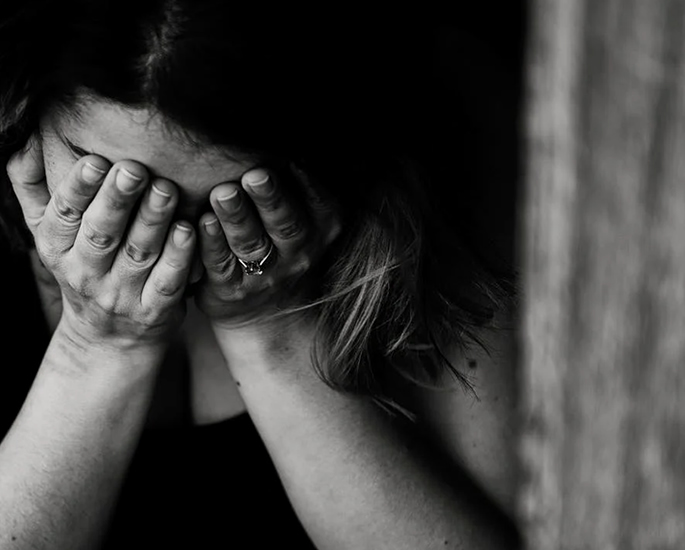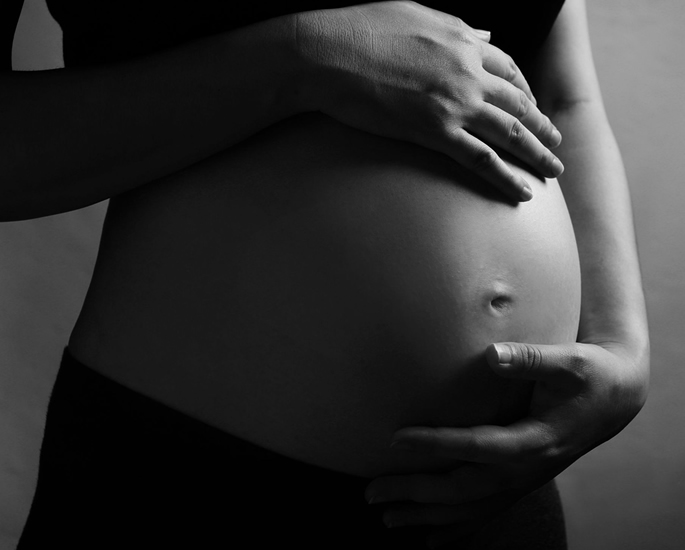“She kept telling me off for lifting a finger.”
Bechari, poor her. Words that Desi women would be lucky to hear after a miscarriage. According to the NHS, miscarriages do not necessarily indicate a problem with either partner.
So then, why are Desi women blamed for miscarriages?
In Desi homes, women are the carriers of the blame for any bad luck during marriage. This is due to patriarchal Desi cultures where sons are kings and superstitions prevail.
Desi women should have the perfect diet during pregnancy, exercise, manage a house and pray. Hot foods are avoided and positive talk is limited to avoid evil-eye. Desi Brits often need to work on top.
What happens then if calamity strikes and a miscarriage happens?
Physical and mental pain isn’t all Desi women have to contend with. Desi women fear sharing the bad news with family members and friends.
A loss of hopes and dreams can happen after miscarriages according to the Miscarriage Association. Support is needed, yet couples can be too afraid to share their loss.
Did Desi women follow the right diet? Did she stop praying or did someone put a curse on her? The poor woman can’t have children.
Whispers are imminent about Desi woman who miscarried. The research regarding miscarriage must be reviewed. Are Desi women really to blame for their miscarriages? Is there any solace for Desi women blamed for miscarriages?
Research on Miscarriages
The medical definition of a miscarriage, according to the Miscarriage Association is as follows.
Miscarriage is when a baby (or foetus or embryo) dies in the uterus during pregnancy. In the UK, that definition applies to pregnancies up to 23 weeks and six days.
According to research by Tommy’s, 1 in 4 pregnant women will experience a miscarriage. The NHS explains that around 75% of miscarriages happen in the first twelve weeks.
The cause of first trimester miscarriages is usually chromosomal abnormalities – problems in the baby’s development.
Chromosomal abnormalities account for over 50% of miscarriages and the NCT Organisation states that this a random event.
Risk of miscarriage more than doubles from 30-years-old at 9-17% to 40% at age 40.
The American Pregnancy Association explains that 50-75% of miscarriages occur before women realise pregnancy. Thus, miscarriage may be far more common than believed.
Over 18 million women were involved in research in the UK in Fertility and Sterility. Evidence suggested the risk of miscarriage may be higher in Asians compared to Caucasians.
Despite this suggestion of increased risk, there are many Desi women blamed for miscarriages.
The NCT goes on to say that no woman should blame themselves for miscarriages. The only controllable factors are smoking, drinking, drugs, eating healthily and a healthy weight.
However, many Desi women blamed for miscarriages have not engaged in harmful behaviour and the event is completely random.
DESIblitz spoke to two women who shared their individual experiences with us.
Aliyah
Aliyah (name changed) fell pregnant and her family’s reaction was joyful.
“I was so happy to find out I was pregnant. My mother-in-law kept telling me to put my feet up.”
Aliyah’s mother-in-law was insistent on taking over the household chores.
“She kept telling me off for lifting a finger.”
Her husband continued his routine but returned from work to meals prepared by his mother.
It was when Aliyah came home after work worn out that her mother-in-law complained.
“Why don’t you quit the job? You’re stressing yourself out too much. It’s not good for the baby.”
Aliyah and her husband needed the money. Her husband and his parents had expected her to work when she married.
Aliyah thought she had brought the loss of her baby on herself.
“My mother-in-law cried and told me it was my fault. She said I had made her lose her first grandchild.”
Her mother-in-law went on to blame everything from Aliyah’s diet to her physique.
Aliyah wasn’t eating enough sabzi (vegetables), according to her mother-in-law. On the other hand, she was accused of eating too much meat.
Aliyah hadn’t followed and shunned food according to Desi pregnancy rules. Her mother-in-law accused her of not exercising enough and blamed her for being too active at work.
Her husband didn’t voice his agreement with his mother nor did he openly disagree.
Aliyah was left wondering if she also thought she was to blame. If she hadn’t focused enough on growing their family.
Aliyah believed her mother-in-law’s allegations and blamed herself.
If she hadn’t had so much stress at work maybe her child would have survived. However, there is no medical evidence that stress has an impact on miscarriage.
Aliyah was one of the Desi women blamed for miscarriages by herself and her mother-in-law.
Faiza
Faiza (name changed) managed to get pregnant after one year of trying.
It was a love marriage and her in-laws never accepted her. Childlessness was proof that Faiza wasn’t right for their son.
However, according to the NHS, medical advice is needed when a couple have been trying to conceive for one to two years.
“Not once did they think it was their son who was the problem.”
Faiza’s in-laws had questioned her ability to have a child.
When Faiza fell pregnant, she felt relief that she could no longer be blamed for their childlessness.
Feeling superstitious, she made her husband promise he wouldn’t tell anyone until the first scan.
“He broke his word to me and told his whole family before we had the all-clear.”
Faiza’s miscarriage happened within a week of her husband sharing the news. No one sent their condolences to her.
“None of them cared that I’d miscarried. Actually, I think they were happy so I wasn’t tied to their son.”
Faiza was convinced that she had been afflicted with the nazar, evil-eye, but her in-laws had other ideas.
She heard her sister-in-law say to her husband: “She must have a problem.”
He hung up the phone and the argument started. Her husband’s betrayal came as a shock.
“The one person who was meant to support me had turned against me.”
Faiza found herself struggling to get out of bed.
“I mourned the loss of my child alone. My body and my mind were damaged and I could feel my marriage breaking.”
Desi women blamed for miscarriages struggle to cope due to lack of support. Faiza’s mental health suffered due to being blamed for the loss of her child.
“I had no one to turn to. My husband blamed me and who else could I really speak about it with?”
Talking openly about miscarriages is still taboo in the Desi community. Women like Faiza can be left to suffer alone in silence, as are many Desi women blamed for miscarriages.
Breaking the Silence
Despite the taboo nature of miscarriages, Desi celebrities have spoken about their personal experiences. The women interviewed by DESIblitz did not wish to share their names.
However, the King of Bollywood, Shah Rukh Khan, spoke out about his experience.
He was reported to have said: “There were some miscarriages.”
Desi women blamed for miscarriages are silenced yet Shah Rukh Khan mentioned multiple miscarriages. This was a brave act and he now has three children with his wife Gauri Khan.
Aamir Khan also spoke out about his and Kiran’s Rao’s miscarriage.
“Kiran and I lost our baby… The last two months have been a struggle for us. Ki and I need time to heal.”
Aamir Khan courageously spoke out about their hard time. It was clear he was supporting his wife. Aamir showed that Desi women blamed for miscarriages don’t need to be held responsible.
Shilpa Shetty also decided to share her experience. She, as a woman, broke the taboo of Desi women speaking about miscarriages. She went on to give birth to a son.
Pakistani model and actress Sana Askari spoke out about her two miscarriages. She stated that she didn’t have any problems that caused her miscarriages. She didn’t allow herself to be one of the Desi women blamed for miscarriages.
Desi women blamed for miscarriages face guilt and can be blamed by their families. This can play a toll on mental health as seen in the women we interviewed and celebrities who spoke out.
It is important that Desi women blamed for miscarriages get the right support. A loss is a loss it does not matter how large or small.
Getting the right help can reduce the impact miscarriages have on Desi women.
More importantly, the support can reduce the dilemma of blame which is certainly something no women needs after losing a baby, Desi or not.































































